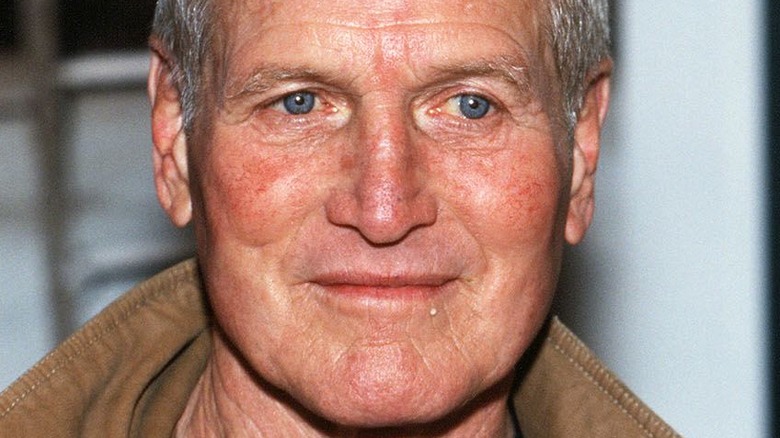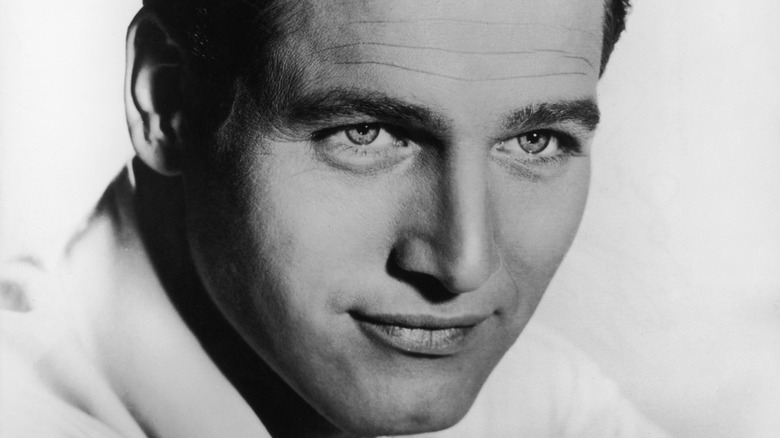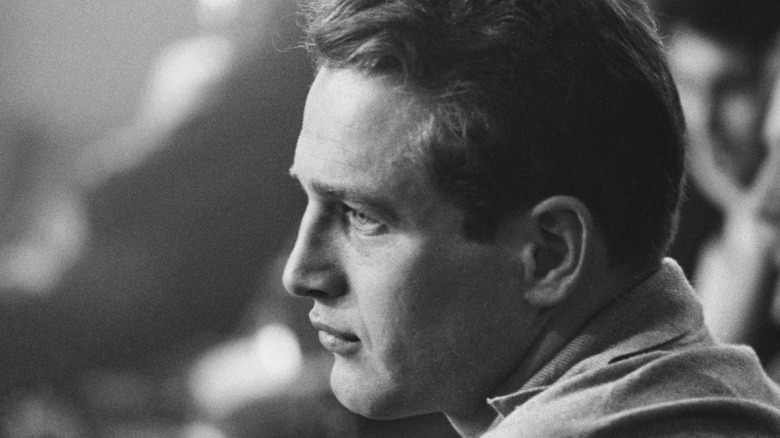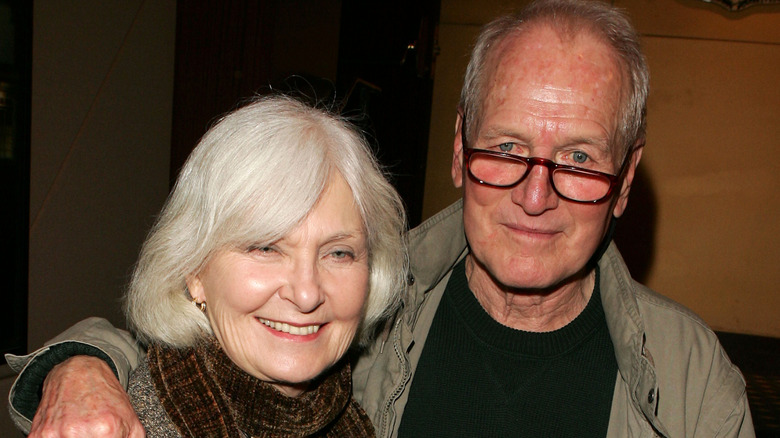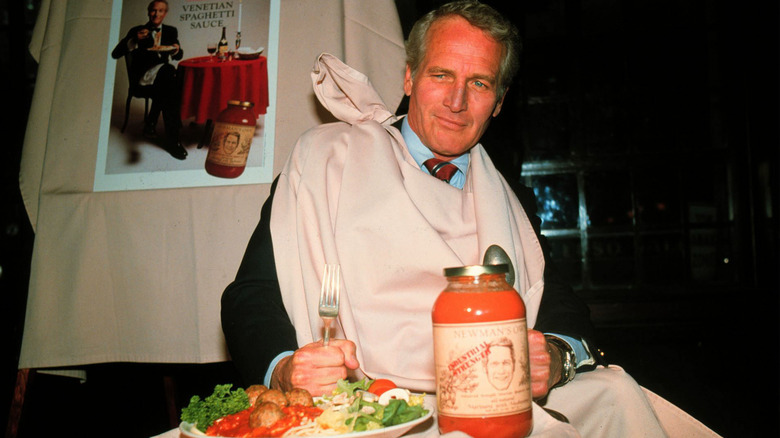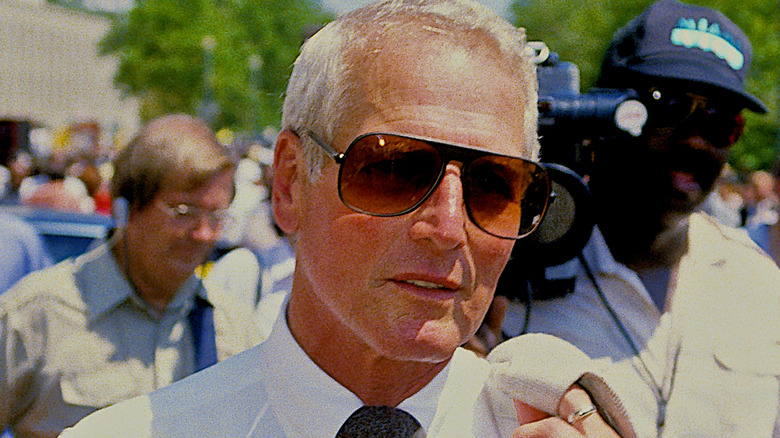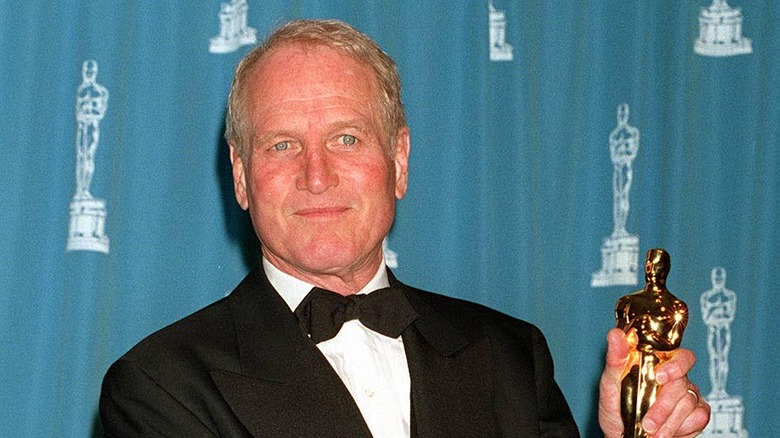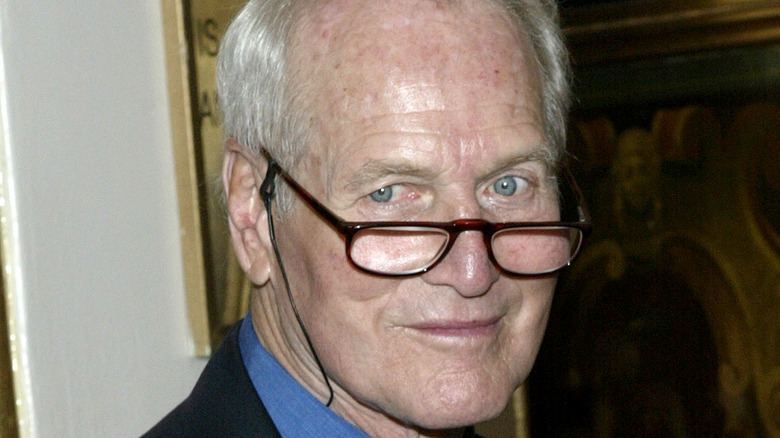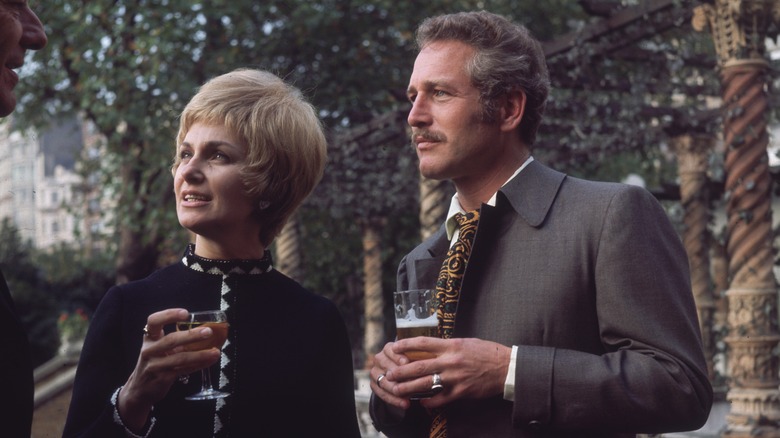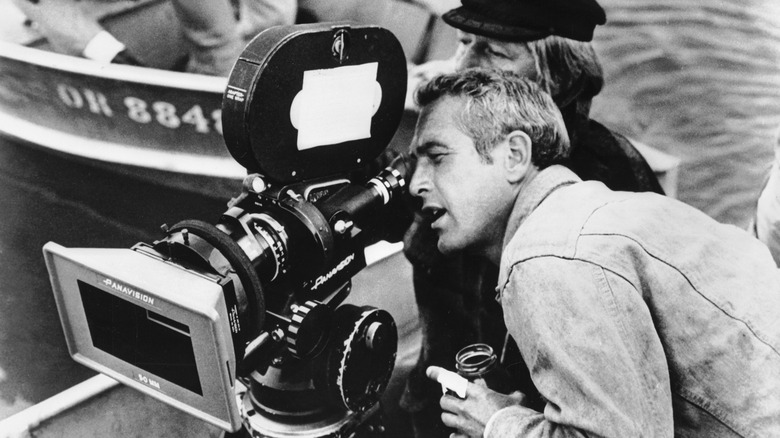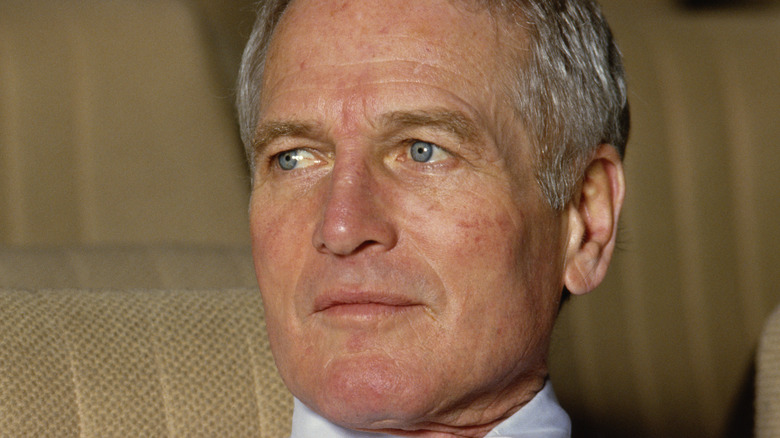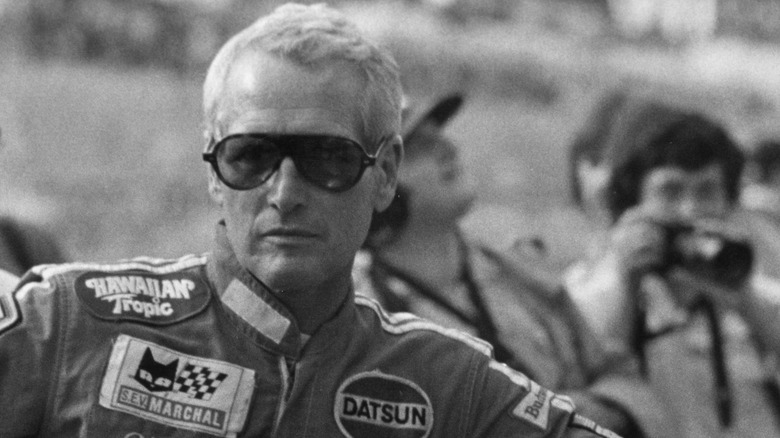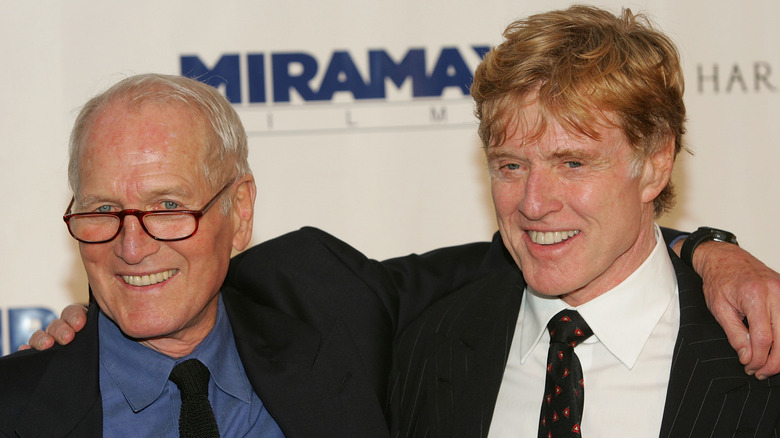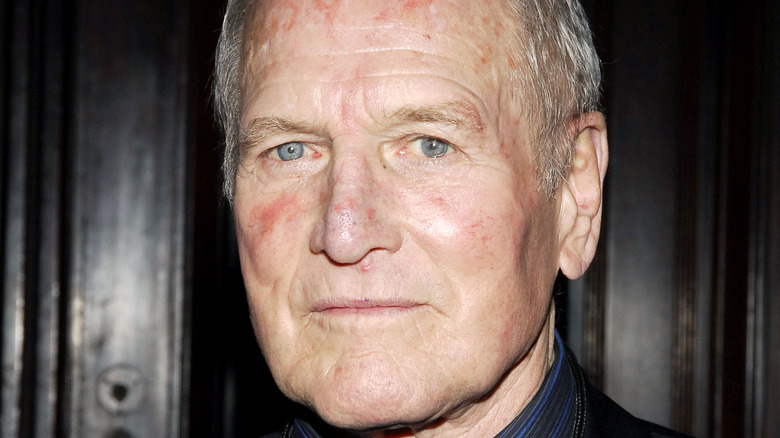Paul Newman: Essential Facts About His Life And Career
We may receive a commission on purchases made from links.
In 1986, Paul Newman and his friend, the screenwriter Stewart Stern, embarked on an ambitious project. Newman would be interviewed by Stern, with the talks recorded for an eventual memoir so that Newman could set the record straight about his life. The actor wouldn't do all the talking, though. A slew of Newman's friends, relatives, and colleagues would also be interviewed, as well as — at Newman's insistence — his first wife Jackie.
According to The New Yorker, Stern had amassed an enormous wealth of information with over 100 interviews by 1991, but Newman reportedly destroyed the tapes in 1998. It was thought that the project would never see the light of day until pages upon pages of transcripts were discovered, per The New York Times. The result is a posthumous autobiography entitled "The Extraordinary Life of an Ordinary Man: A Memoir," published in October 2022.
Newman is candid about his comfortable upbringing in Shaker Heights, Ohio, his troubles as an adult, and what he considered the burden of fame. "Smiling for the cameras is a smile that doesn't come from anywhere except a command; there's no mirth in it," Newman says in his book (via Time). Newman's memoir is a reminder of a more glamorous era, when movie stars were truly larger than life. We look at Newman's life and career, as well as some facts perhaps only the most diehard Paul Newman fans may know.
Paul Newman was half Jewish and from Ohio
Paul Leonard Newman was born in Cleveland, Ohio, on January 26, 1925 and grew up in Shaker Heights. In his memoir, Newman calls this town "the Cleveland suburb that every other American suburb aspired to become." He indicates that the neighborhood excluded families who were not white.
Newman's mother was Catholic and his father Jewish. "The only thing my mother ever liked about me being a movie star is how much it impressed the Jewish half of my family," Newman says in his uncovered interview transcripts. "She was always intimidated by them. I'm half Protestant, half Jewish. But I've always thought of myself as a Jew because it is harder." These words are spoken by George Clooney as the voice of Newman in Ethan Hawke's HBO Max docuseries, "The Last Movie Stars" (via The Buffalo News).
Newman details experiencing antisemitism because he was half Jewish; he was denied entry into a high school fraternity, being told, "...we can't have Jewish brothers." Newman's mother became a Christian Scientist and the family celebrated Christmas, but his upbringing was otherwise secular. Newman explains, "My father, unlike some of his relatives, was always a nonpracticing Jew." The actor adds that his dad rented seats at the local synagogue and subscribed to a Jewish newspaper, but he did not own a menorah. "...my father displayed no outward symbols of Judaism. ... Still, he was anything but naive about the bigotry Jews faced in the world," Newman shares.
He was originally a Broadway star
Per The New Yorker, Paul Newman served in the Navy and then began acting at Kenyon College in Ohio. He graduated in 1949, pursuing performing arts to escape his family's business in sporting goods. Newman studied drama at Yale for a year, and before starring in motion pictures and 1950s TV, the young talent was on Broadway. His debut came in 1953 in William Inge's play "Picnic," which ran for 477 performances and led to his first movie contract.
"When I got the job in 'Picnic,'" Newman recalls in his memoir, "I had a wife and child (with another on the way) and only $250 in the bank. I don't know how long I would have been able to stay afloat without some financial cushion or if the play didn't run." He followed "Picnic" with "The Desperate Hours" in 1955, starring Karl Malden. After he did his next two Broadway plays, "Sweet Bird of Youth" in 1959 and 1964's "Baby Want a Kiss," Newman was already a major movie star, having appeared in "Cat on a Hot Tin Roof," "The Hustler," and "Hud."
Joanne Woodward was artistic director of the Westport Country Playhouse in their Connecticut hometown, and the two performed together in a 2000 staging of A.R. Gurney's "Ancestral Voices." Newman returned to Broadway in 2002 for a limited-run revival of Thornton Wilder's "Our Town" as the Stage Manager, and received a Tony award nomination for best actor in a play. Newman planned on directing "Of Mice and Men" in Connecticut in 2008 but stepped down, citing health issues (per The Guardian).
Paul Newman fell in love with Joanne Woodward while still married to his first wife
Paul Newman and Joanne Woodward were a Hollywood power couple whose 50-year union seemed to defy the short marriages and infidelity seen in some showbiz pairings. Alas, this union wasn't without its problems. Newman met Woodward when she was an understudy in his first Broadway play, "Picnic." Newman was married with children, and he and Woodward carried on a five-year affair before he divorced his first wife Jackie and married Woodward. Newman admits in his memoir, "I was living my life with Jackie and I was living my life with Joanne."
The divorce left Jackie devastated, according to Newman's daughter from his first marriage, Stephanie. In the 2022 docuseries "The Last Movie Stars," Stephanie says, "I was a baby and had to watch my dad and stepmom ride off into the sunset with Hollywood contracts. ... It's an unbearable story" (via CBS "Sunday Morning").
Newman and Woodward teamed up to make 16 films together. Newman famously told Playboy magazine about his devotion to Woodward: "I have steak at home. Why go out for hamburger?" (according to Men's Health). Yet during the making of "Butch Cassidy and the Sundance Kid" in 1968, Newman allegedly had an affair with a journalist named Nancy Bacon, as detailed in Shawn Levy's biography "Paul Newman: A Life." Per the Daily Mail, the affair reportedly lasted about a year. Newman makes no mention of it in his memoir.
The charitable contributions of Newman's Own
Paul Newman loved good food and was quite the gourmet. "I remember Paul cooked," recalled film editor Dede Allen in Newman's memoir. "That always impressed me, that they did their own cooking." In 1980, Newman and his Westport, Connecticut neighbor, the writer A.E. Hotchner, concocted a rather simple salad dressing that they would bottle and give to friends as gifts for the holidays. The reception was such that they were encouraged to take the dressing to supermarkets. "It got started as a joke and it just got out of control," Newman told Oprah Winfrey.
In 1982, Newman's Own was founded with the mission that 100% of the profits after taxes go to charitable causes, and the company has given away $570 million dollars since its inception. The Newman's Own line quickly expanded to include pasta sauce, popcorn, lemonade, and salsa, as well as an organic line of food products that Newman's daughter Nell oversaw.
As a foodie, Newman was especially particular about his salads. He was known to insist on going into the kitchen and making his own dressing at the Carlyle Hotel. His favorite salad consisted of Bibb and endive lettuce, cherry tomatoes, red onion, red bell pepper, and most importantly, extra crispy bacon, all topped off with (what else?) Newman's Own original olive oil and vinegar dressing. Following Newman's death in 2008, the Newman family ceased its involvement with the Newman's Own brand, which Newman left his adviser Robert H. Forrester in charge of. In 2022, daughters Nell and Susan Newman sued the Newman's Own Foundation for not honoring Paul Newman's charitable wishes.
Paul Newman was on Richard Nixon's enemies list
Paul Newman, like most of his Hollywood counterparts, was a liberal Democrat. At times outspoken, Newman voiced his opposition to the Vietnam War in 1969. Newman was also one of many notable public figures who turned up on President Richard Nixon's "enemies list," a document Nixon compiled of those he considered to be his political opponents. Newman felt being on the list was something of an honor. "He was tickled pink and framed it," his daughter Nell told the AP (via Today).
The list was first made public in 1973 by the Senate Watergate Committee. Among those considered a political threat to Nixon in addition to Newman were Carol Channing, Jane Fonda, Steve McQueen, Tony Randall, and Barbra Streisand (pretty decent company). The purpose of the list was to perform IRS audits on Nixon's opponents, although the IRS commissioner at the time, Donald C. Alexander, refused to do so.
In Newman's memoir, Newman's late friend, political activist Harold Willens, recalls that in 1968 Newman would spend weekends in New Hampshire campaigning for Sen. Eugene McCarthy for president. There was a local car rental agency which provided him with a nice automobile. "Paul learned that Richard Nixon was coming to the state to campaign and he was to receive use of this same car," Willens remembers. "Paul wrote a note and left it in the car for Nixon: 'You'll find this car very suitable for you. It has a crooked clutch.'"
His journey to winning at the Oscars
By 1986, Paul Newman had been nominated six times for the best actor Oscar without winning. The Motion Picture Academy bestowed upon Newman an honorary Oscar that year. "In recognition of his many memorable and compelling screen performances and for his personal integrity and dedication to his craft," his "Absence of Malice" co-star Sally Field said when presenting. Newman was unable to accept the award in person because he was in Chicago filming "The Color of Money," a sequel to the "The Hustler," in which he starred 25 years earlier. He accepted via satellite and joked, "I'm especially grateful that this did not come wrapped as a gift certificate to Forest Lawn."
"The Color of Money" co-starred Tom Cruise, who, with the release of "Top Gun" earlier that year, was the hottest young actor in Hollywood and would go on to become friends with Newman off-screen. Reprising his role of Fast Eddie Felson, a one-time pool shark turned liquor salesman, Newman gave one of his most nuanced performances and finally won the Oscar that had eluded him for decades. Newman did not attend the ceremony, however, telling the Associated Press, "It's like chasing a beautiful woman for 80 years. Finally, she relents, and you say, 'I'm terribly sorry. I'm tired'" (via Business Insider).
In 1994, Newman was given his second honorary Oscar, the Jean Hersholt Humanitarian Award, in recognition of his charitable and philanthropic efforts. Tom Cruise was the presenter.
Paul Newman refused to sign autographs
Paul Newman struggled with the irritations of paparazzi who could never be appeased with just a few photos. The actor was also notorious for not signing autographs for his fans. "I'll tell you when I stopped signing them," he told Barbara Walters. "I was standing at a urinal ... And then it went back through my head all the times that Joanne and I had been sitting at dinner tables having dinner and interrupted constantly... The people that say, 'Can I have your picture with my dog? Take off your glasses, we want to see your blue eyes' — to which I usually say, 'I will if you'll let me see your gums.' Or, 'I can't, my pants will fall down.'"
Newman continued, "I don't know who started this ritual of autographs, but I certainly wasn't around to vote on it." He was clearly frustrated by this aspect of movie star fame, which does sound pretty stressful at times.
In his memoir, Newman elaborates on his reasoning and acknowledges that some fans have shown resentment for his no autograph policy. "It would make my life a lot easier if whenever someone stopped me on the street and asked, 'Ooh, let me take your picture,' I said OK." Of course, this would naturally invite larger crowds to approach the celebrity, turning one little autograph into many more than he bargained for. Newman contemplates the issue generously but ultimately decides, "I wish I could, but I can't ... and that doesn't make me a bad person" (via Time).
Paul Newman has been called 'a functioning alcoholic'
Paul Newman, his friends, and his colleagues openly discuss his drinking in "The Extraordinary Life of an Ordinary Man." "Drinking used to be the anguish of our lives," Joanne Woodward said. Professionally speaking, Newman sometimes would prepare for a role by getting drunk. "On some occasions I would lock myself in a hotel room with a 12-pack of Budweiser just to see where I would go in this thing," he said on "Inside the Actors Studio." "You'll be happy to know that 90 percent of this discovery was useless."
Tom Cruise recalled in Newman's autobiography, "He'll torture himself by drinking a case of beer, then sit in the sauna for hours. He laughs about it — what alcohol does to your body and what a sauna does to your body is like constantly pulling yourself from one extreme to the next." In his biography "Paul Newman: A Life," author Shawn Levy calls Newman "a functioning alcoholic" and notes that the star wore a bottle opener on his necklace.
"There are terrible, bad things that happen with booze, dangerous things," Newman writes in his memoir. "I marvel that I survived them."
If you or anyone you know needs help with addiction issues, help is available. Visit the Substance Abuse and Mental Health Services Administration website or contact SAMHSA's National Helpline at 1-800-662-HELP (4357).
He directed six movies
As Paul Newman's acting career continued to flourish in the 1960s, he decided to branch out into producing and directing. The star told the Bay Area's KRON 4, "The reason I started directing was that it was very very difficult to find scripts to do as an actor. There were scripts that I read that I would've said, 'Gee, I would have loved to have been connected with that project."
Newman directed five feature films and one made-for-TV movie, all featuring Joanne Woodward. 1968's "Rachel, Rachel" marked Newman's directorial debut. The story concerns a virginal small-town schoolteacher (Woodward) and the sexual awakening that liberates her. The film received four Oscar nominations, including best picture for Newman, who produced it, and best actress for Woodward, who won a Golden Globe for her work. The role is widely considered one of Woodward's best performances. Though snubbed by the Oscars for a directing nomination, Newman was named best director by the New York Film Critics Circle and won the Golden Globe for best director, as well as a nomination from the Directors Guild of America.
Newman followed "Rachel, Rachel" with 1971's "Sometimes a Great Notion," a picture he also starred in. Newman next directed Woodward, as well as their daughter Nell, in 1972's "The Effect of Gamma Rays on Man-in-the-Moon Marigolds," followed by the acclaimed TV-movie "The Shadow Box" in 1980, 1984's "Harry & Son" starring Newman and Robby Benson, and a 1987 adaptation of Tennessee Williams' "The Glass Menagerie," Newman's final film as a director.
The heartbreaking death of his only son at age 28
Paul Newman's son Scott died from "an accidental overdose of a tranquilizer and alcohol" on November 20, 1978 (per The New York Times). Scott was Newman's only son from his first marriage. Like his father, Scott was pursuing an acting career and shared his famous father's matinee idol looks. He had a half-dozen screen credits, his first being 1974's "The Towering Inferno," which co-starred his father.
"I kept thinking he was going through a phase of adolescent bad judgment," Newman writes in his memoir (via People). "I never thought it would be fatal." Newman reflects on his father's closet drinking and his own problems with alcohol. "I've wondered in recent years whether the serious problems I eventually had with booze, that Scott suffered so terribly with addiction, might have somehow been partly inherited — bad blood with the Newman men."
In 1980, Paul Newman founded the Scott Newman Foundation, later renamed the Scott Newman Center, a non-profit organization committed to preventing domestic violence and substance misuse. In 1994, the center established the Rowdy Ridge Gang Camp, a summer camp program for families impacted by the issues the non-profit addressed. In 2013, facing a decline in financial support, the center and its camp were dissolved.
If you or someone you know is dealing with domestic abuse, you can call the National Domestic Violence Hotline at 1−800−799−7233. You can also find more information, resources, and support at their website.
If you or anyone you know needs help with addiction issues, help is available. Visit the Substance Abuse and Mental Health Services Administration website or contact SAMHSA's National Helpline at 1-800-662-HELP (4357).
Paul Newman was an accomplished racecar driver
In 1969, Paul Newman starred in the film "Winning," playing an ambitious professional racecar driver who aims to compete in the Indianapolis 500. To prepare for the picture, Newman trained at the Watkins Glen Driving School in Central New York. Newman took an instant liking to auto racing, and at age 47 competed in his first professional event at Thompson International Speedway in Thompson, Connecticut (per Jalopnik). "You know what this reminds me of? A theater," Newman said of racing on "Iconoclasts: Robert Redford + Paul Newman." "It has its audience, its cast, drama, comedy, and sometimes its tragedy too."
Newman raced for 35 years, winning his last race at Lime Rock Park in Connecticut just one year before his death in 2008. During that time, he won four national championships as a driver and eight as an owner, per Chassy Media. "He wasn't so much divided between the two," said Robert Redford in "Winning: The Racing Life of Paul Newman." "It was that film would come second to racing." Joanne Woodward chimed in, "His whole career looked as though it were going to go down the drain because all he wanted to do was race."
On August 13, 2008, less than six weeks before his death, Newman rode his final laps in his GT1 Corvette at Lime Rock Park, which shut down just for Newman.
Robert Redford and Paul Newman were friends off-screen
Paul Newman and Robert Redford only made two movies together, yet they are known as one of cinema's best male buddy teams. "I first met Paul Newman in 1968, when George Roy Hill, the director of Butch Cassidy and the Sundance Kid, introduced us in New York City," wrote Redford in a remembrance for Time. "When the studio didn't want me for the film — it wanted somebody as well known as Paul — he stood up for me. I don't know how many people would have done that..."
During the making of "Butch Cassidy and the Sundance Kid," the two actors forged a friendship off-screen that lasted 40 years. Their second and final film was 1973's "The Sting," also directed by George Roy Hill. Although they didn't see each other often, they kept in touch and had deep respect for one another. Hill thinks they could have been closer, though. "They did friendly things together," the director says in Newman's memoir, "but there's a quality of reserve in both men that has them basically uncomfortable with each other, except in a work situation where they obviously get along very well."
Redford saw Newman a few months before he died, and Newman was hospitalized repeatedly. Redford remembered for Time. "I knew what the deal was, and he knew what the deal was, and we didn't talk about it. We talked about what was on our minds: the election, politics, what needed to be done. Ours was a relationship that didn't need a lot of words."
Paul Newman was 83 when he died in 2008
In 2008, stories about Paul Newman's health were quickly spreading. He had been sighted coming out of Weill Cornell Medical Center in New York City in a wheelchair. Newman was being treated for cancer and an unidentified source told the Daily Mail that he wanted to die at home. While lung cancer was rumored, the specific type wasn't confirmed. Private till the end, when asked what he was being treated for, he answered in typical Newman fashion: "Athlete's foot and hair loss," per Vanity Fair. A spokesman for Newman would only tell the outlet that the actor was "doing nicely."
Sadly, Joanne Woodward was diagnosed with dementia not even ten days before Newman received the news that he had terminal cancer (via CBS "Sunday Morning"). Newman died on September 26, 2008 in his Westport, Connecticut home. Tributes from friends and colleagues immediately followed. "I have lost a real friend," Robert Redford said in a statement (via Today). "My life — and this country — is better for his being in it."
"I loved that man with all my heart. He was goodness and kindness and pure integrity," Elizabeth Taylor said in a statement (via Reuters). In "Iconoclasts: Robert Redford + Paul Newman," archival footage of Newman was shown where he pondered what he wanted his epitaph to say. The actor joked, "I do not want written on my tombstone, 'Here lies Paul Newman, who died a failure because his eyes turned brown.'"

